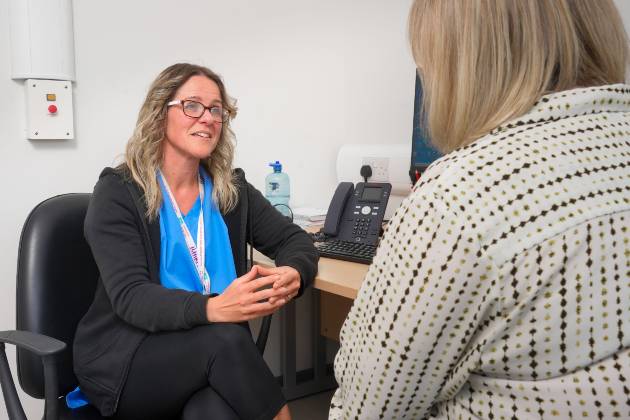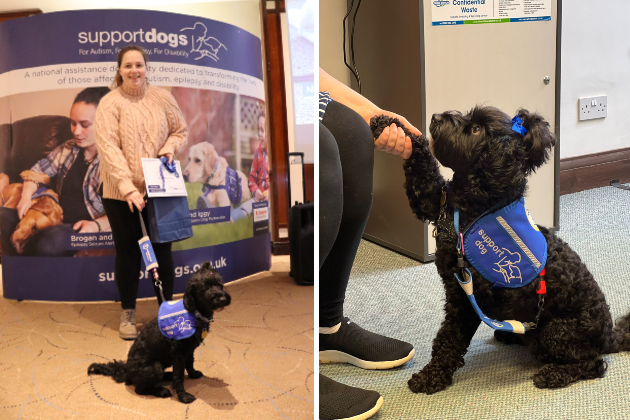Freezing temperatures mean nursing staff can sometimes struggle to reach their patients. But staying safe is always a priority. RCN rep Yvonne negotiated with her employer to secure special equipment so that members are protected, whatever the weather.
For RCN safety rep Yvonne Thomas, snow and ice can make travelling treacherous, especially as she sometimes drives up to 100 miles in a working day, visiting as many as 20 patients to provide care in their homes.
“We work in some very rural areas, where I might have to walk across three fields to get to a patient,” explains Yvonne, who is a district nurse team leader based in Aberystwyth in mid Wales. “We still visit some houses that don’t have running water inside, with their toilet at the bottom of the garden.”
Faced with increasingly harsh winters, Yvonne decided to trial wearing special snow shoes over her own footwear to see if they provided better grip in icy conditions.
“The last thing I want is to break a leg falling over,” says Yvonne, who is also an RCN steward. “We’ve had a few years now when we’ve had a lot of snow and it’s tended to stay for a while on the roads and pavements.”
The special snow shoes proved such a success that she lobbied her employer, Hywell Dda University Health Board, to provide them for every member of her team of five full-time and five part-time district nurses, as part of their uniforms.
“They go over your own shoes and are very good at stopping you slipping in the snow, but they’re also really easy to take off, once you reach your patient’s home,” says Yvonne.
Everyone feels much safer when they go out and see patients, so they're happier at work
A strong case
To strengthen her case, Yvonne carried out a thorough risk assessment, showing what might happen, including potential injuries caused by falling on snow while working.
“If you have identified a risk, but then your employer doesn’t do anything about it, it can be very problematic for them,” she says.
For others wishing to achieve similar results for their members, she advises clearly detailing the need, alongside what the outcomes might be if the advice on equipment isn’t followed.
Point out that any failure to supply what is needed presents a possible health and safety risk for staff, Yvonne suggests.
As full-time staff are often working until at least 6pm, when they may still be out and about visiting patients, she also persuaded her employer to supply high vis jackets and vests as part of the nurses’ uniforms.
“These changes have made a big difference for our nursing staff,” says Yvonne. “Everyone feels much safer when they go out and see patients, so they’re much happier at work.”
Yvonne added: “Our employer has also rolled this out more widely now so special snow boots and high vis jackets are provided for all community staff in Ceredigion, which is great.”
'It shouldn't be a battle'
RCN National Officer Kim Sunley says: “This is fantastic work by Yvonne, holding her employer to account and making sure members are safe.
“But it shouldn’t be a battle. Employers have a legal duty to assess the risk of harm to employees, including risks to nursing staff working in the community in poor weather conditions. Employers should take all reasonable measures to reduce those risks.
“If you’re an RCN safety rep and your employer isn’t taking action, you can contact RCN Direct on 0345 772 6100 for advice, or speak to your RCN officer.”
Advice for staying safe in extreme weather conditions
- If you're having trouble getting to work because of bad weather, contact your manager as soon as possible. Your employer’s policy should advise you on what to do.
- If you are travelling into work in bad weather, let someone know what time your journey starts and when you expect to arrive. Make sure you confirm your safe arrival.
- There’s no legal requirement to pay staff who can’t get to work, but your employer’s policy may make allowances. Employers should discuss the situation first before making any deductions.
- If your workplace is closed, generally speaking, if you’re ready and willing to work, your employer should still pay you. Read more about pay when your workplace is closed.
- Employers can ask you to take annual leave, but they must give the correct notice. Check your contract.
- In emergency situations involving dependents, such as a school closure, all employees have the right to take unpaid time off. But check contracts and local policies first, as there could be entitlements or options to take annual leave, use time flexing or make up the time on your return.
What should you do, if someone offers you a lift to work?
In recent years, members of the public have sometimes been asked to volunteer their 4x4 vehicles and drive nursing staff to work during bad weather. It’s admirable, but strong consideration needs to be given to the safety of staff.
Refuse transport from a stranger or if you feel unsafe. If you’re happy to accept, keep your mobile switched on and let someone know the details of who is driving you, when you leave and what time you should be home.
Words by Lynne Pearce. Pictures by Stuart Fisher.
More information
Read our advice guide on travel disruption and getting to work.








